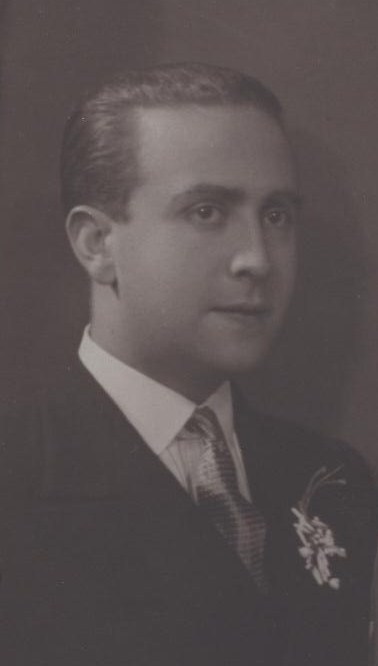Tune in every day @ 1PM when Intermezzo host Chris Wolf will feature a complete recording by the Chilean pianist.
Claudio Arrau, renowned throughout the world as one of the supreme keyboard masters of the century, persued only one goal: the total fusion of virtuosity and meaning.
Arrau was born in Chillan Chile, on February 6, 1903 and like most of history's great pianists, was a child prodigy. His mother was an amateur pianist and his father an eye doctor, who died in a riding accident when Arrau was one-year old.
In order to support herself and her three young children, Lucretia Leon de Arrau, an indomitable woman, began to give piano lessons. Claudio, her youngest, was allowed to sit in so she could keep an eye on him and the result was that he could read notes before he could read words.
By five, the boy gave recitals both in Chillan and in Santiago and by seven, he and his entire family, including an aunt, were on their way to Berlin (the musical Mecca of that time) where the young piano genius was to study on a Government grant (by an act of the Chilean Congress) over the next ten years.
In Berlin, after blundering around for two years with wrong teachers, Arrau, at ten, finally found the teacher he needed. He was Martin Krause, a pupil of Liszt's, a famous music critic and the friend of all the great musicians of his time. Between the young boy and the grand pedagogue, it was love at first sight. For Arrau, Krause became the father he never had and to Krause, Arrau was the pupil he had been searching for. "He will be my masterwork," said Krause, who also taught Edwin Fischer.
In Berlin, the young boy heard all the great pianists of the day; Terese Carreno, d'Albert and later, Busoni, and they all became his idols, especially Carreno and Busoni.
At 15, when Krause died from the great flu epidemic of 1918, Arrau was left without a teacher. But so much had been imparted to him that he preferred to go on by himself, winning the famed Liszt Prize twice in a row at ages 16 and 17.
When Arrau was 20, hearrived for his Carnegie Hall debut on October 20, 1923. Arrau was already a seasoned artist who had played throughout Europe since the age of 11, had appeared with Nikisch in Leipzig at 12, and at 17, had made smash debuts both in London (at the Royal Albert Hall) and in Berlin with the Berlin Philharmonic under Karl Muck.

Arrau had come to the United States for a promised tour of 30 dates and found himself with only five: three concerts in New York and appearances with the Boston and Chicago Symphonies. Boston under Monteux and Chicago under Stock were splendid. Carnegie Hall, with the house mostly empty, was far less so. Arrau, thinking himself a failure, returned home to Berlin no richer than he had come, and that, he says today, was probably the best thing that could have happened to him at the time, artistically-wise.
Between 1924 and 1940 he taught at Julius Stern’s Conservatory in Berlin.

In 1937, Arrau married mezzo-soprano Ruth Schneider (1908–1989), a German national. They had three children: Carmen (1938–2006), Mario (1940–1988) and Christopher (1959).
In 1941 the Arrau family left Germany and emigrated to the United States, eventually settling in New York City, where Arrau spent his remaining years. He became a naturalized U.S. citizen only in 1979, after the rise of Augusto Pinochet in Chile. Arrau continued his frequent touring past his 80th birthday.
Arrau focused his considerable powers on the music of Liszt, Johannes Brahms, Frédéric Chopin, Robert Schumann, Claude Debussy, and, above all, Ludwig van Beethoven. In 1935 he played all the keyboard works of J.S. Bach in a series of 12 concerts. His performances of the complete piano sonatas of Beethoven (there are 32) were broadcast by the British Broadcasting Corporation (BBC).
Arrau died on June 9, 1991, at the age of 88, in Mürzzuschlag, Austria, from complications of emergency surgery performed on June 8 to correct an intestinal blockage. His remains were interred in his native city of Chillán, Chile.
Arrau’s awards are too numerous to mention, and his library of recorded works is enormous. Regarded as one of the least ostentatious of the century’s virtuoso pianists, he developed a classical approach that exhibited an extreme concentration on detail without sacrificing feeling.
The famed late doyen of London music critics, Sir Neville Cardus of the Guardian, explained Arrau vividly: "Arrau is the complete pianist. He can revel in the keyboard for its own pianistic sake, representing to us the instrument's range and power, but he can also go beyond piano playing as we are led by his art to the secret chambers of the creative imagination."
In a tribute by the Berlin Philharmonic, which bestowed the Hans von Bulow Medal on Arrau in 1980, on the occasion of the 60th Anniversary of his debut with that great orchestra, it was put even better: "When Arrau bends over the keyboard, it is as if Music and only Music itself, is flowing out of his entire body. There is not a nuance of feeling or sound that he has not mastered. His pianissimo is more eloquent, more mysterious than that of others, and his fortissimo has more depth of dimension and is more limitless."
But a London Sunday Times interview explained the Arrau mystique best of all: "One regards him as a sort of miracle; the piano is the most machinelike of instruments except the organ - all those rods, levers, little felt pads, wires, no intimate subtle human connection with it by breath, tongueing, or the string player's direct engagement with speaking vibrations. But Arrau makes it live, like God teaching Adam on Michelangelo's Sistine Chapel roof; liquid, mysterious, profound, alive."
Sources: https://www.princeton.edu/~gpmenos/biography.html
https://www.britannica.com/biography/Claudio-Arrau
https://en.wikipedia.org/wiki/Claudio_Arrau






